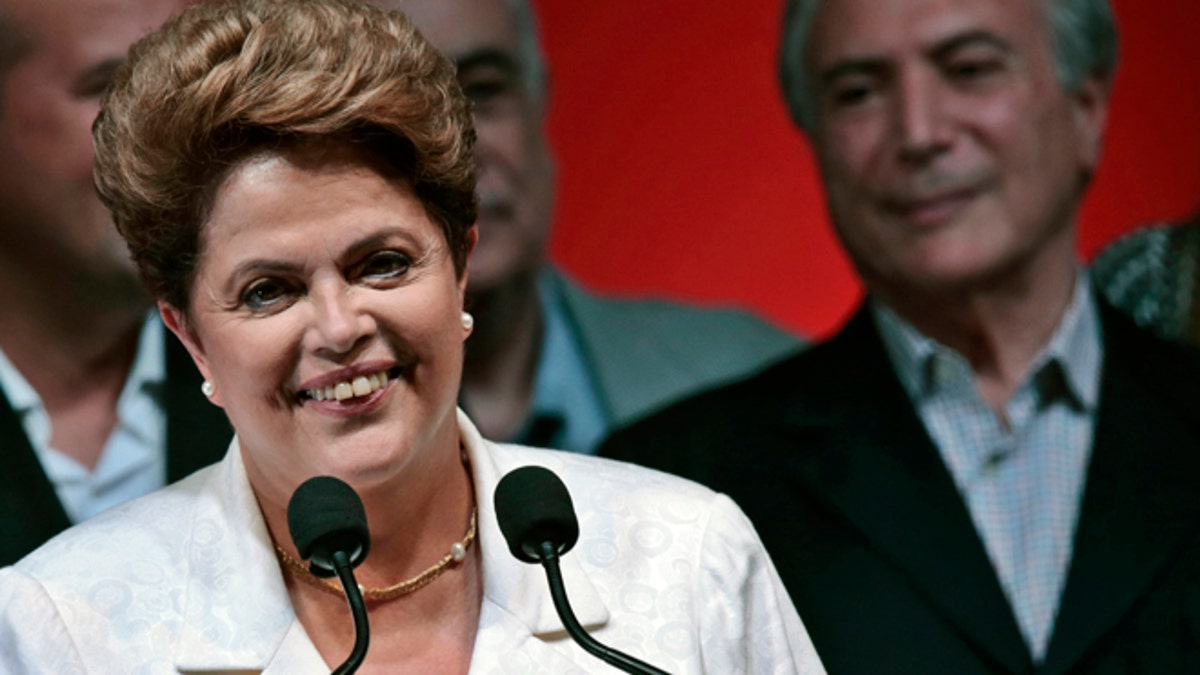
Oct. 26: Dilma Rousseff smiles during news conference after disclosure of the election results, in Brasilia. (Reuters)
RIO DE JANEIRO – Left-leaning President Dilma Rousseff was re-elected Sunday in the tightest race Brazil has seen since its return to democracy three decades ago, giving the juggernaut Workers' Party its fourth-straight presidential victory and the chance to extend its social transformation of the globe's fifth-largest country.
Rousseff took 51.6 percent of the votes and center-right challenger Aecio Neves had 48.4 percent, with almost all ballots counted. The result reflected a nation deeply divided after what many called the most acrimonious campaign since the return to democracy, with charges of corruption, nepotism and ample personal barbs thrown by both sides.
The re-elected leader faces an immense challenge of reigniting a stalled economy, improving woeful public services that ignited huge anti-government protests last year, and trying to push political reforms through a highly fragmented congress where the governing coalition has less support than it did four years ago.
Speaking in front of a banner that read "New Government, New Ideas" and a giant photo of Rousseff from her days as a militant who fought against Brazil's long military regime, she thanked her supporters, starting with her political mentor and predecessor Luiz Inacio Lula da Silva, who picked her to take his place in 2010.
"My dears, my friends, we have arrived at the end of a campaign that intensely mobilized all the forces of this country," Rousseff said. "I thank every Brazilian, without exception."
She added that she "thanks from the bottom of my heart, our No. 1 militant, President Lula," as the former leader used a handkerchief to wipe tears from his eyes.
Rousseff sounded a conciliatory tone, saying during the live broadcast that she understood the heightened demands of Brazilians. "That's why I want to be a much better president than I have been until now," she said.
During the Workers' Party time in power, the government has enacted expansive social programs that have helped pull millions of Brazilians out of poverty and into the middle class, transforming the lives of the poor.
But the globe's seventh-largest economy has underperformed since 2011, with some fearing it could put the social gains at risk.
"Dilma has social inclusion on her side, but the macroeconomic policies during her first four years in office have been very weak," said Carlos Pereira, a political analyst at the Gertulio Vargas Foundation, Brazil's leading think tank.
"Inflation has returned, the country is in a technical recession and public spending is out of control. It is less likely she will be able to offer social inclusion and macroeconomic stability at the same time."
The choice between Rousseff and Neves split Brazilians into two camps -- those who thought only the president would continue to protect the poor and advance social inclusion versus those who were certain that only the contender's market-friendly economic policies could see Brazil return to solid growth.
Rousseff and Neves fought bitterly to convince voters that they can deliver on both growth and social advances. This year's campaign is widely considered the most acrimonious since Brazil's return to democracy in 1985, a battle between the only two parties to have held the presidency since 1995.
Neves had hammered at Rousseff over a widening kickback scandal Petrobras, with an informant telling investigators that the Workers' Party directly benefited from the scheme.
Rousseff rejected those allegations and told Brazilians that a vote for Neves would be support for returning Brazil to times of intense economic turbulence, hyperinflation and high unemployment, which the nation encountered when the Social Democrats last held power.
"We've worked so hard to better the lives of the people, and we won't let anything in this world, not even in this crisis or all the pessimism, take away what they've conquered," Rousseff said before voting in southern Brazil.
In Brazil's biggest city of Sao Paulo, thousands of Workers' Party supporters gathered on a main avenue, waving banners as a truck with giant speakers blasted Rousseff's campaign jingles.
"I'm very happy because I think the construction of Brazil has barely begun and now we will have continuity," said Liliane Viana, a 56-year-old retired federal government worker. "I was afraid we were going to move backward. Now I am extremely excited."
Neves was a two-term governor in Minas Gerais state who left office in 2010 with a 92 percent approval rating. He surged at the end of the presidential race to score a surprise second-place position and force a runoff vote against Rousseff.
Speaking from his hometown of Belo Horizonte, he thanked the "more than 50 million Brazilians" who voted for him.
"I will be eternally grateful to each and every one of you who allowed me to dream again of the construction of a new project," he said. "I fought the good fight. I fulfilled my mission and I kept the faith."







































